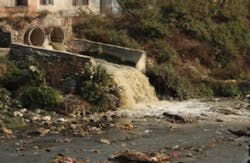WERF expands research with new projects exploring wastewater as a resource
ALEXANDRIA, Va. — The Water Environment Research Federation (WERF) announced it is expanding its research with three new projects examining wastewater as a resource, according to a press release.
One of the three projects examines a new method of reducing phosphorus in wastewater, and the two other projects aim “to show that materials in wastewater can be commoditized,” stated the release.
The release reported that a research team at the University of Nebraska-Lincoln will take biomass from wastewater treatment facilities and convert it into isoprene, and also renewable biofuel, using an engineered microbe.
A study, to be conducted by Greeley and Hansen, will develop economic and technological platforms “for the conversion of organic carbon compounds to commercially attractive chemicals and commodities,” and will consider substrates’ generation for biodiesel production, precursors to biodegradable plastics and alternative vehicle fuels from water resource recovery facilities, continued the release.
An enhanced biological phosphorus removal (EBPR) process will be investigated by Northeastern University, and this research could help change the understanding and ability to sustainably and cost-effectively preserve and safeguard water resources, noted the release.
You can find the release here.
